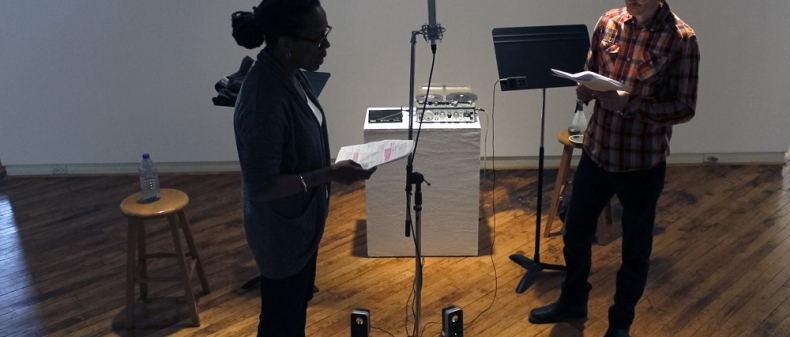
Deanna Bowen and Russell Bennett, Paul Good/Robert Shelton Character Study (2012)
Gallery 44 is replete with ephemera. The hallway vitrines just outside the gallery house a series of newspaper articles, their colours reversed, white print on black paper. To the immediate left of the gallery entrance is a poster for a rally in Macon, Georgia that specifies “WHITE PUBLIC INVITED.” One wall is beginning to be covered in a series of dimly lit photographs, depicting two people standing around a microphone, with room set aside for more. A reel-to-reel tape player squats next to a precarious-looking pile of tape-reel boxes; both are perched atop a rickety desk. A framed feature article from the Saturday Evening Post hangs on the far wall; photographs of Ku Klux Klan members, decked out in full regalia, stare out from between reams of text. In the adjoining room, three black-and-white found photographs — their content clear and crisp, but their subject vague and indistinct — watch over a video projection.
Deanna Bowen’s new show, The Paul Good Papers, one of the off-screen gallery shows mounted in conjunction with the Images Festival, focuses on two moments in the history of the Ku Klux Klan’s third wave: their involvement in the riots surrounding school integration in Alabama circa 1964, and an ABC News interview with Robert Shelton, then-president of the United Klans of America. Journalist Paul Good covered both of these events.
This is, at its core, a researcher’s show. Bowen unearthed all of these documents while looking into the history of the Klan in Canada, and the exhibition organizes and presents her discoveries. It’s a dense show, and it rewards an extended visit. Bowen’s touch is wisely light throughout; the purely documentary ephemera — the Post piece, the various vitrine articles (from Canadian newspapers, by the by), the Klan rally poster — form a picture disturbing enough that no further artistic liberties or interpretation are necessary. And her two moments of intervention, apparently straightforward as they might seem, are potent and deft examples of political art-making.
An old microphone and two lecterns with scripts stand in the middle of the gallery. For the duration of the show, every day at 1 pm, Bowen and actor Russell Bennett re-enact Good’s interview with Shelton. Each session is recorded, both on the reel-to-reel tapes and on camera. Each day, another photograph from the recording session is added to the gallery wall, another canister of audiotape gets piled up next to the tape player (the recordings can be played upon request), and each day, Bowen and Bennett’s performance shifts slightly. Different words are emphasized, different accents and dialects are tried on. At some point, they’ll swap roles, and Bowen, a black woman, will play the role of the Klansman.
There is the documentary shock of the audio: hearing casual conversation liberally peppered with the word “negro” (in Bennett’s southern accent, it sounds more like “nigruh”); listening to a Klansman espouse political legitimacy and make recourse to the Constitution. But what makes the transcribed interview and its re-enactment so captivating is the way that shock echoes and reverberates into the present. This document represents the foundations of far-right American politics, and one hears in Shelton’s attempt to make overt racism politically palatable the rhetoric of the Tea Party and evangelical Republicans. One also hears what has now become classic right-wing rhetorical strategy, the adoption and subversion of progressive speech and idioms for their own ends. Shelton glibly cribs the nonviolent revolutionary oratory of Gandhi and Martin Luther King Jr. Bowen has us listen to the president of the United Klans of America not so that we can claim moral superiority over some redneck honky, but to confront the polite voice of hatred, and moreover, to demonstrate just how fully that voice is reflected in contemporary politics.
Bowen’s other intervention comes in the form of a video. It’s twenty-some-odd minutes long, and most of it is a soundtrack played over abstract black and white film-scratch patterns. The first segment is the audio recording of Good at an attempt by 12 black students to integrate a Notasulga, Alabama high school (the mayor of the town actively bars their entry, and a riot ensues, in which Klansmen brutalize a cameraman). The second part of the audio recording is an interview with the mayor, who parrots, albeit less smoothly, Shelton’s media tactics.
And then the scene shifts: it’s a young woman with a beehive hairdo, smoking a cigarette, sipping a bottle of Coke and singing along with the Beatles on the radio. This was 1964, after all. It’s a masterful little coda to the whole show. Like a Breughel painting in which a horse scratches its ass on a tree while Icarus falls from the sky, Bowen reminds us that life ambled on alongside all these racial politics and strife: there was Coke and cigarettes and the Beatles! And whether this girl represents the gentle rhythms of quotidian existence or its deliberately neglectful self-delusion is the most troubling of the many questions Bowen leaves open.
Deanna Bowen’s The Paul Good Papers continues until April 21 at Gallery 44. Daily performances at 1 pm.
______
Sholem Krishtalka is the Toronto Standard’s art critic.
For more, follow us on Twitter at @torontostandard, and subscribe to our newsletter.














